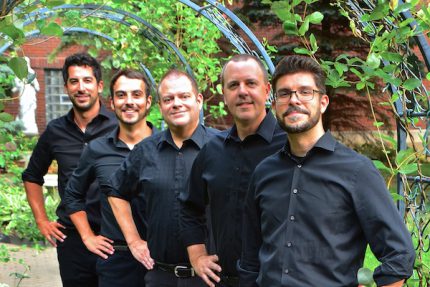His Majesty’s Men span the centuries, from Byrd to a world premiere

St. John Cantius Church got a royal visit Saturday night when His Majesty’s Men performed a selection of motets at a concert titled “Laments & Praises.” Included among these was the world premiere of Usquequo, Domine? by Chicago native Mark Nowakowski.
As the courtly name of this five-man group might indicate, they are modeled on English early-music ensembles like The King’s Singers and the Tallis Scholars.
Unlike those venerable ensembles, His Majesty’s Men is of recent origin (founded only in 2016) and based in Chicago rather than the U.K., with the exception of their leader, countertenor Richard Childress. But like those other groups, they focused on music from chronological extremes (the kind that earns the labels “early” or “contemporary”). With one exception, every composer on Saturday’s program either died before 1650 or is still alive.
Two snags prevented the concert from reaching perfection. One was the lack of printed texts. (Childress’s spoken remarks indicated that he thought they were in the programs.) Lacking them, audience members without Latin or prior knowledge of the pieces could not recognize moments of evocative text-painting or follow the dramatic arc of the settings.
The other stumbling block was that the ensemble’s balance overly favored the higher voices. Baritone Joe Labozetta and bass Michael Hawes were frequently much less audible than Childress and tenors Matthew Dean and Nathaniel Adams.
Childress’s voice was the most resonant and timbrally distinctive, often standing apart when there were solo lines. This was a liability only when they needed to sing dense polyphonic fabrics—such as in Dufay’s Alma Redemptoris Mater (with which they opened the concert) or Byrd’s Nos enim pro peccatis nostris—which require more democratic participation.
This problem did not affect pieces with long chordal stretches, during which His Majesty’s Men revealed their skill at blending and tuning in complex harmonies. As a consequence, they were at their very best in some of the contemporary works, such as Chris Hutchings’s Nunc Dimittis and Ivan Moody’s Canticum Canticorum I, which allowed them to display this talent to its fullest.
The new work, Nowakowski’s Usquequo, Domine?, suited them particularly well. The parts for Labozetta and Hawes often sat low, which gave their sound added richness. In the opening section, Childress, Dean, and Adams sang in different combinations above this accompaniment, revealing facets of each man’s voice.
Nowakowski shows a keen sense of form in this setting of a passage from Habakkuk 1:1-5, which cries out for divine strength in times of strife. The demarcations between sections were clear. And several of them built surprisingly quickly from a low, quiet beginning to a high and loud climax, and yet managed to sustain that energy.
The piece’s ending—often a weak spot in contemporary pieces—was particularly effective. Just at the moment when one thought the final cadence has been reached, the music (and, consequently, the desire for closure) was drawn out and there was a surprise modulation before the actual conclusion was reached.
Another highlight of the concert was His Majesty’s Men’s performance of Pablo Casals’s setting of “O Vos Omnes.” This mostly homophonic piece became an exhibition of their intelligent and expressive use of dynamics, shaping not only individual phrases but also long paragraphs.
The official program concluded with the group’s signature piece, Childress’s arrangement of Kurt Bestor’s “Prayer of the Children.” Joined by Kirsten Hedegaard, the surprise encore was a work unearthed only a few years ago—the opulent six-part motet Dimitte me, ergo by the 16th-century Spanish composer Bernardino de Ribera.
Posted in Performances




